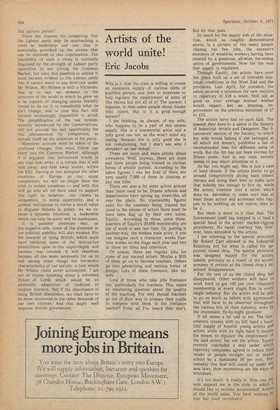Artists of the world unite!
Eric Jacobs
Why is it that the state is willing to create an excessive supply of various sorts of qualified person, and then to intervene to help regulate the employment of some of this excess but not all of it? The answer, I suppose, is that some people shout louder than others. But is it a good enough answer? I am thinking, as always, of my wife, who happens to be a part of this excess supply. She is a commercial artist and a jolly good one too, as she won't mind my saying. Because she is jolly good she is not complaining, but I don't see why I shouldn't on her behalf. There are more and more artists about nowadays. Well, anyway, there are more and more people being trained in various . forms of artistic pursuit. According to the latest figures I can lay hold of there are very nearly 7,000 of them in training at any one time. There are also a lot more actors around than there used to be. Drama schools and departments have sprung up, weed-like, all over the place. No trustworthy figures exist for the numbers being trained but clues to the excess of actors there must be have been dug up by their own union, Equity. According to these, some three quarters of Equity's 20,000 membership are out of work at any one time. Or, putting it another way, the median male actor, if you can imagine such a character, works fourteen weeks on the stage each year and two to three on films and television.
Of course, there are regular jobs for some of our trained artists. Maybe a fifth of them go on to become teachers. Others go into advertising and various forms of design. Lots of them freelance, like my wife.
Lots of those who take jobs freelance too, particularly the teachers. This raises an interesting question about, the quality of the teaching. For why should teachers q,o out of their way to prepare their pupils to compete with them in the freelance market? From all I've heard they don't.
But let that pass.
So much for the supply side of the situation, which as roughly demonstrated above, is a picture of too many people chasing too few jobs, the excessive members of would-be workers having been created by a generous, all-wise, far-seeing series of governments. Now for the way that supply is regulated. Through Equity, the actors have over the years built up a set of tolerable minimum conditions in the West End and the provinces. Last April, for instance, the union secured a minimum for new recruits to repertory of £18 a week. Still not as good as your average manual worker would expect, but an amazing improvement on the previous minimum of £7 to £15. The artists have had no such luck. The nearest they have to a union is the Society of Industrial Artists and Designers. The illustrators' section of the Society, to which my wife would belong if she belonged at all which she doesn't, publishes a list of recommended fees for different sorts of work. But the list has not been revised for fifteen years. And in any case, nobody seems to pay much attention to it. So far, you might say, this is just a case of hard cheese. If the artists prefer to go around competitively slicing each others' throats and doing their best to make sure that nobody has enough to live op, while the actors combine into a union which does its darnedest to make sure that at least those actors and actresses who happen to be working do not starve, then so be it.
But there is more to it than that. The Government itself has stepped in to lend a special hand to the actors' market-rigging procedures. No equal courtesy has, however, been extended to the artists.
I am referring to the special provision Mr Robert Carr allowed in his Industrial Relations Act for what is called the approved closed shop. The special provision was designed mainly for the actors, indeed, precisely as a result of the actors' screams of protest at the closed shop's imminent disappearance. For the rest of us the closed shop has disappeared. Other workers will have to work hard to get 100 per cent voluntarY membership at every single firm in every single industry. But the actors will be able to go on much as before with agreements that will have to be observed throughout the various bits of their industry, even bY the crummiest, fly-by-night producer. It all seems a bit odd to me. The Government creates with its left hand a bowl' tiful supply of hopeful young artists and actors, while with its right hand it creates the means to regulate the employment ef the said actors, but not the artists. Equity recently concluded a deal under which repertory companies agreed to reduce their intake of people straight out of drains school by a handsome 50 per cent. Pre' sumably this deal will stand up under the new laws. How mysterious are the ways of Whitehall.
It's too much. It really is, How can MY I wife support me in the style to which should like to become accustomed? ArtiStS of the world unite. You have nothing t° lose but your overdrafts!










































 Previous page
Previous page